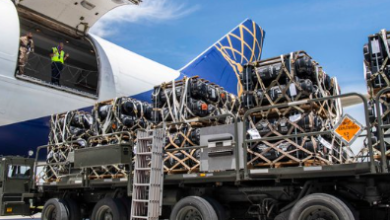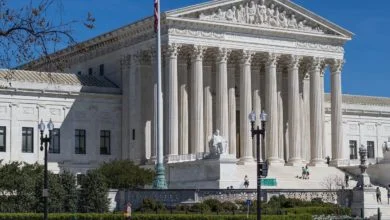Medal of Honor Monday: Army Lt. Col. Matt Urban
Army Lt. Col. Matt Urban was only 24 when he became his battalion’s commander as the Allies pushed further into France during the summer of 1944. His tenacity and outstanding leadership during that campaign led to him becoming one of the most decorated soldiers of all-time — including as a Medal of Honor recipient.
Urban was born Matthew Louis Urbanowicz on Aug. 25, 1919, in Buffalo, New York. His parents, Stanley and Helen Urbanowicz, were Polish immigrants. He had two older brothers, as well as a younger sibling who died at an early age. Urban shortened his first and last names early in life but had them legally changed after World War II.
Urban went to East High School in Buffalo, where he excelled in three sports. He then went to the prestigious Cornell University, where he joined ROTC and was on the track and boxing teams. He graduated in mid-June 1941 with a bachelor’s degree in history and government. He also received an Army commission, so on July 2, 1941, he shipped off to Fort Bragg, North Carolina, to begin his service.
Throughout World War II, Urban served with the 60th Infantry Regiment, 9th Infantry Division. He fought in six campaigns in Europe and the Mediterranean, including Operation Torch that began Nov. 8, 1942, in North Africa — service for which he earned two Silver Stars. Urban fought in Sicily and Germany, too. But he earned his Medal of Honor for his actions in France and Belgium in the summer of 1944.
A Season of Uncommon Valor
On June 14, 1944 — six days after landing at Normandy with the 2nd Battalion — then-Capt. Urban started a remarkable run of heroic leadership and personal bravery. His unit, Company F, was being decimated by heavy enemy small-arms and tank fire near Renouf, France. Urban knew he had to act quickly, so he picked up a bazooka and moved toward two enemy tanks.
Urban worked his way through hedgerows despite a continuing barrage of fire. When he got close enough, he popped into the enemy’s view and fired the bazooka, destroying both tanks. His actions allowed his company to move forward and take out the rest of the enemies in the area, earning him a Bronze Star.
Later that afternoon, Urban was hit in the leg by a 37-mm tank gun when Company F was near the town of Orglandes. However, he refused to be evacuated and continued to lead his unit until they were able to move into defensive positions for the night.
At 5 a.m. the next day, Urban remained with his company and directed another attack, even though he was badly wounded. He was injured again during that battle and evacuated to England.
About a month later, Urban was recovering from his wounds when he learned his unit had suffered severe losses. He knew they needed battle-tested leaders to survive, so he voluntarily left the hospital and hitchhiked his way back to his unit, which was now near the town of Saint-Lo.
Shortly before noon on July 25, 1944, Urban arrived at the 2nd Battalion’s command post to find that his unit had left within the hour to attempt to break through German defenses in the area. Limping from his leg wound, Urban made his way to the unit and retook command.
As he did so, Company F was having trouble moving forward. Two supporting Allied tanks had been destroyed, while another that was still intact wasn’t moving because it had no commander or gunner.
Urban found a lieutenant in charge of the tanks and began directing a plan of attack; however, that lieutenant and a fellow soldier were immediately killed as they tried to mount the remaining tank. So, Urban — knowing how crucial it was to get that tank moving — dashed through enemy fire despite his bad leg and mounted the tank himself.
Even though bullets ricocheted all around him, Urban ordered the tank forward and, using its machine gun himself, delivered devastating fire back on the enemy. The battalion’s soldiers took notice of his bravery and leadership, and it galvanized their courage. They were able to attack and destroy the enemy position.
Urban’s heroic actions were far from over. On August 2, he was wounded in the chest by shell fragments but again refused evacuation. Four days later, at only 24 years old, he took the lead over the 2nd Battalion after its initial commander was killed in action. Nine days after that, he was again wounded but still chose to stay with his men on the battlefield.
On Sept. 3, 1944, the 2nd Battalion was tasked with finding a point to cross the Meuse River near Heer, Belgium; however, the Germans were hoping to stop the Allied advance there. They were waiting with a heavy concentration of their own forces.
As the 2nd Battalion moved toward the crossing point it had located, they were held back by fierce enemy artillery, small-arms and mortar fire. Urban moved quickly from his command post to the battalion’s lead position and reorganized the attacking elements. He then personally led the charge toward the enemy’s strongpoint.
As the men moved across open terrain, Urban was hit in the neck — a life-threatening injury that tore out one of his vocal cords. Urban could barely talk above a whisper, but he still refused to be evacuated until his men had won the battle and secured the crossing point over the river.
Urban’s courage and extraordinary actions became legendary to the soldiers in his battalion, as well as among the enemy. In fact, he’d earned the nickname “The Ghost” from the Germans because he kept coming back to the fight.
Army doctors gave Urban no hope for survival once he was finally evacuated from the battlefield, but he recovered undeterred by their prognoses, even though his vocal cords remained damaged and left him with a permanent raspy voice.
Urban was promoted to the rank of major in October 1944. He became a lieutenant colonel before medically retiring from the Army in February 1946.
Urban moved to Port Huron, Michigan, where he served for several years as the town’s recreation and community centers director. During the 1960s, he met his wife, Jennie, and they had a daughter, Jennifer. In 1972, the family moved to Holland, Michigan. According to Cornell University, over the course of his civilian career, Urban coached several sports programs and trained athletes who became Olympians and Golden Glove champions. He was eventually appointed the chair of the Michigan Olympic Boxing Committee.
Belated Honors
Meanwhile, Army Staff Sgt. Earl G. Evans, who served with Urban in Europe and Africa, was released from a German prisoner of war camp in July 1945. Upon Evans’ return home, he recommended Urban for the Medal of Honor, but his letter apparently got lost and never made it to the correct authorities. Thankfully, though, a copy of it had been filed in Urban’s official records.
That letter remained there until a request for information about it was submitted in June 1978. The Army eventually reviewed the Medal of Honor recommendation and agreed.
More than 35 years after that summer in 1944, Urban was notified he would be awarded the nation’s highest military honor for valor. He received it on July 19, 1980, from President Jimmy Carter during a ceremony at the White House. It was attended by his wife and daughter, as well as hundreds of his fellow 9th Infantry Division soldiers.
Urban’s other awards include the Croix de Guerre with Bronze Star from France, the Belgian Fourragere and seven Purple Hearts for the wounds he suffered throughout the war. All of his accolades make him one of the most decorated soldiers in U.S. history, on par with famed Army Maj. Audie Murphy.
Service Until the End
Urban retired from his civilian career in 1989, but he remained active in the Red Cross. According to Cornell, he also directed camps that served underprivileged children; was a Cub Scout leader, Boys Club director and a Boy Scouts chairman; and was inducted into the Hall of Fame of the Michigan Amateur Softball Association.
Urban died on March 4, 1995, in Holland, Michigan, as the result of complications from a collapsed lung brought on by one of his war wounds. He is buried in Arlington National Cemetery.
The 2nd Battalion’s headquarters building at Fort Jackson was named for Urban in 2017. A duplicate of his Medal of Honor is housed at the Michigan Heroes Museum in Frankenmuth, Michigan.
This article is part of a weekly series called “Medal of Honor Monday,” in which we highlight one of the more than 3,500 Medal of Honor recipients who have earned the U.S. military’s highest medal for valor.
Source: Department of Defense
Content created by Conservative Daily News is available for re-publication without charge under the Creative Commons license. Visit our syndication page for details.




